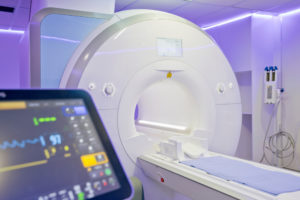 If you’re at the doctor’s office and they want to schedule you for an MRI Scan, you might wonder why and even think the process sounds intimidating. In truth, MRI scans and other types of diagnostic imaging tests are tools that can provide your doctor with a clearer picture of an internal area that may be damaged by injury or illness. When it comes to diagnostic imaging, your doctor should walk you through the type of MRI that may be best for your case that will help provide answers and inform an appropriate treatment plan.
If you’re at the doctor’s office and they want to schedule you for an MRI Scan, you might wonder why and even think the process sounds intimidating. In truth, MRI scans and other types of diagnostic imaging tests are tools that can provide your doctor with a clearer picture of an internal area that may be damaged by injury or illness. When it comes to diagnostic imaging, your doctor should walk you through the type of MRI that may be best for your case that will help provide answers and inform an appropriate treatment plan.
MRI stands for “Magnetic Resonance Imaging” and is a type of diagnostic imaging test that produces images of the inside of your body via radio and magnetic waves. This type of imaging is often the most detailed and can help when you have an illness or injury that affects multiple parts of your body, like bones, muscles, organs, nerves, and other soft tissues. An MRI can help your doctor identify any abnormalities that may need to be addressed with medical care. Unlike X-rays or CT scans, MRI scans do not use any radiation and offer a more non-invasive look inside your body.
Open vs. Closed MRI
When you hear about an MR scan, the first thing you might think of is that it’s loud or claustrophobic. While some people do experience claustrophobia and find MRIs to be extremely uncomfortable, these state-of-the-art diagnostic tools are constantly redesigned to meet the needs of every patient. There are now closed and open MRI machines available to help improve the experience for you.
Contrast MRI
If your doctor requests an MRI with contrast, this means you will be injected with a contrast dye before the scan. The contrast dye can help show clearer images of certain health conditions, like back problems, stroke, infection, or even to detect certain types of tumors. The dye can improve the visibility of your internal structures and can also help your doctor measure and assess growths like tumors.
Functional MRI
A functional MRI, sometimes called an fMRI, measures blood flow to your brain and checks for brain activity. This type of MRI scan will “light up” when certain areas of your brain are activated, like when you perform a certain task. This type of MRI is common for assessing a brain injury. A functional MRI may also be used to test for dementia or Alzheimer’s disease. If you are about to undergo surgery, your doctor may also request a functional MRI to rule out any brain tumors or risk of epilepsy.
Cardiac MRI
A cardiac MRI will take detailed pictures of your heart, blood vessels, and see how your circulatory system is functioning. This type of MRI is used to detect any blockages in your blood vessels or any problems with the structure of the heart. Your doctor may also recommend a cardiac MRI if you have damage from a heart attack or they suspect problems with the aorta, which is the main artery in your body. A cardiac MRI can also be used to detect tumors inside the heart.
Musculoskeletal MRI
A musculoskeletal MRI is most common for assessing illnesses or injuries that affect your bones, joints, muscles, and other soft tissues. This type of MRI is used to detect spinal injuries like a herniated disc, spinal fracture, or spinal cord compression. Hairline fractures can be difficult to detect on an X-ray, which is where a musculoskeletal MRI can be helpful. A musculoskeletal MRI can also help your doctor look for any damage to your joints, like tears in the cartilage, ligaments, or tendons due to arthritis or injury.
What can you expect from AICA Atlanta? When you visit your doctor at AICA Orthopedics in Atlanta, our teams of multi-specialty doctors work together to provide you with an individualized treatment plan and comprehensive care. This may include recommending an MRI to better evaluate how your injury or illness is impacting your body. A unique benefit of Atlanta’s AICA Orthopedics facilities is how we offer these state-of-the-art diagnostic imaging tools in-house. That means you can see your doctor and go for an MRI scan all in one convenient location.
